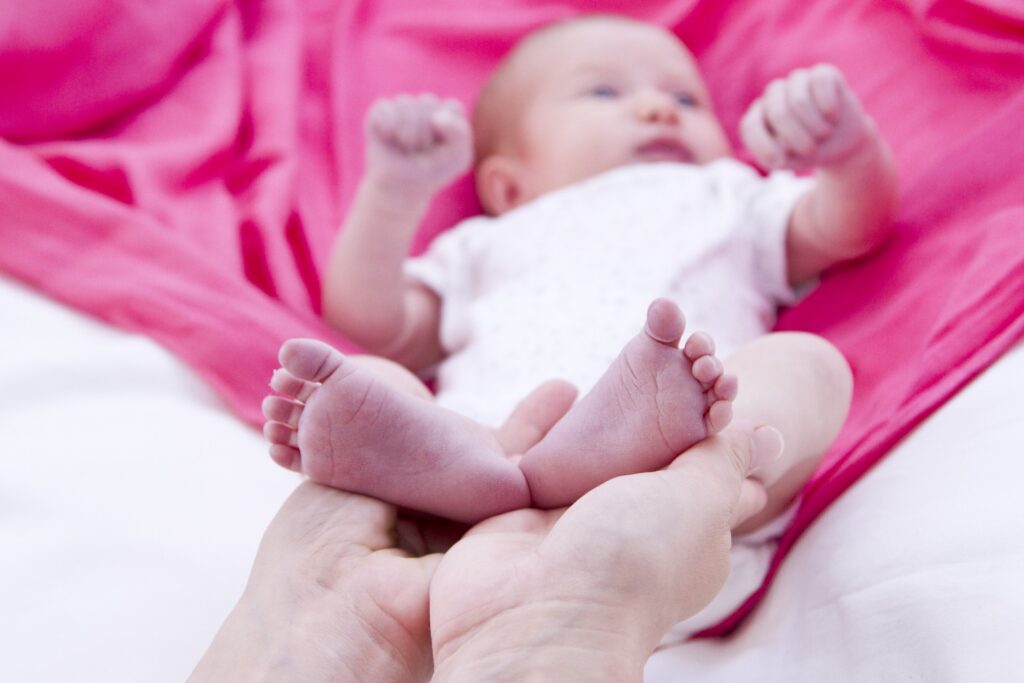Let’s discover together the benefits of baby massage and how it can be a resource for all parents.

In 2017 I started my journey to become a baby massage instructor. I often talk about how important this training has been for me, in terms of the benefits that newborn massage brings to both babies and parents.
But also because it has helped me to understand what it really means to share our feelings with our babies and to begin a loving relationship that sometimes is not automatic.
Many parents, in fact, do not really know where to start when they hold their baby in their arms for the first time. How to meet him/her, how to take care of him/her, how to behave with him/her. In more extreme cases, some people do not recognise and/or do not accept the idea of becoming a parent, for a variety of reasons or because of psychological problems.
It is clear that a massage course for newborns is not only for struggling parents: even if we became parents for the first, second, third, fourth time (or even more!) and we feel good in our role, the massage can only strengthen our joy and our ability to communicate with the love language .
But let’s have a look to the most important benefits of baby massage:
Promotes parent-child attachment
From the very first weeks, as I mentioned in the introduction, the foundations for a strong parent-child relationship are laid.
We call it bonding, derived from the verb “to bond”, which means to attach, to bind, to link.
In the child care field, it has been used to define the connection between parents and babies: that situation in which the parent, through his or her actions, including practical acts such as rocking, caressing, feeding, comforting and, more concretely, washing, dressing, walking, playing, interacting, etc., lays the foundations for the transmission of concrete messages to the baby, who then feels welcomed and understood.
These actions, however, are purely physical, practical, and most of us are able to do them automatically. The other side of the bonding coin, therefore, concerns the purely emotional sphere of both parties:
- looking at our baby
- talking to him/her gently and telling constantly how happy we are to have him/her in our arms
- smiling at her
- holding him warmly when criing
- keeping skin-to-skin contact
- massaging her
are all actions that stimulate endorphins, make us feel good and give the baby those non-verbal, non-obvious messages that fill all hemispheres of the attachment.
Solution for colics
During a massage course we are taught to massage the belly. The movements of this massage greatly help to relieve the discomfort of colic, which in the vast majority of cases occurs in the second month.
Many people try to explain the colic of the newborn, and we can find two categories: there are those who consider that colic is a real phenomenon and those who affirm the opposite.
I also believe that, in the vast majority of cases, we confuse colics with the baby’s de-stressing in the evening: when the sun goes down, in fact, many babies start to be very prone to crying.
This is mostly related to the neurological immaturity of the baby, who feels the need to evacuate all the emotions and sensations he has experienced during the day. On the other hand, it tends to reflect the anxiety of the parent, tired from the day and worries about the upcoming night.
Belly massage works on two fronts: firstly, it restores the emotional balance for both parent and baby. Secondly, if there is indeed colic due to some air in the tummy, the mechanics of the massage will certainly allow the air to flow out.
Promotes relaxation
As the massage encourages relaxation for both parent and baby, it is very helpful to do a few massage sequences during the bedtime routine.
I generally recommend massaging the legs, as this is the part that babies are most likely ok with, even when they are tired. Alternatively, belly or back massage. One area of the body is more than enough, as we don’t want to make the routine itself too long.
Conclusions
These are just three examples of what massage can do for you. As you surely understood, I really invite you to get in touch with the closest instructor to you, to learn all the other countless positive elements that a massage course could bring to your lives as parents.
For people living in Geneva, I also offer home sessions, as well as group sessions (visit here if you are interested).
Otherwise, contact your nearest family counselling centre or ask your midwife or gynaecologist to put you in touch with the closest instructor to you!
You can also call the IAIM office (here is their website).
You will not regret it!
How many of you have done a newborn massage course (individual or group)?
How did you find it?

